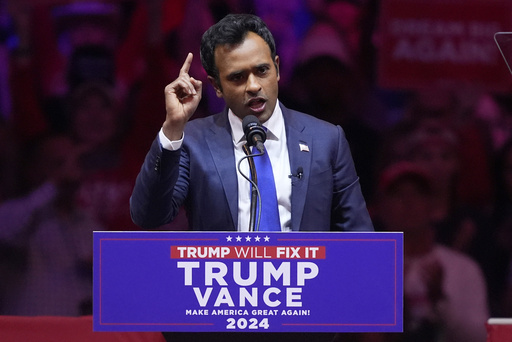**Trump Faces Economic Challenge Amidst Deepening Debt Issues**
Donald Trump is gearing up to implement significant economic changes, but he faces a substantial obstacle in the form of the national debt. With ambitious plans involving tax reductions, tariffs, and various reforms, the financial landscape is complicated by burgeoning interest rates and the federal government’s existing debt obligations, which now sit at approximately $36 trillion. The fallout from the pandemic has exacerbated this issue, leading to increased borrowing costs that threaten to surpass national security spending in the upcoming year.
The rising expense of servicing the debt constrains Trump’s capacity to maneuver within the federal budget. His desire to enact income tax reductions is complicated not only by the high debt levels but also by the costs that many Americans face, such as increased mortgage rates and car loans due to elevated interest rates. These economic pressures played a role in his return to the presidency in the recent elections.
Shai Akabas, director of the economic policy program at the Bipartisan Policy Center, highlighted the impact of debt on interest rates, particularly affecting housing affordability. “The escalating costs for essentials like housing and groceries are going to create adverse effects on our economy,” he commented. Notably, Akabas pointed out that around 20% of government expenditures currently go towards repaying accrued debt instead of investing in crucial sectors like education and infrastructure.
Trump acknowledges the pressing nature of these financial issues. Upon naming billionaire Scott Bessent as his nominee for treasury secretary, he stressed the need to “curb the unsustainable path of Federal Debt.” However, the servicing costs associated with the existing debt compound challenges as Trump seeks to renew the tax cuts implemented in 2017, many of which are set to expire soon. The ramifications of these tax cuts could further elevate interest rates, aggravating the debt servicing obligations and nullifying any potential economic benefits they might yield.
Criticism arises from various factions, pointing out that Trump’s tax proposals are likely to deepen the deficit. Brian Riedl, a senior fellow at the Manhattan Institute, emphasized that pursuing the same tax cuts now could be deemed irresponsible, given that the deficit has seen substantial increases.
Democratic leaders and economists argue that the proposed tax reductions predominantly benefit the wealthy, which would exacerbate the funding shortfall for vital programs aimed at supporting middle and lower-income groups. Jessica Fulton from the Joint Center for Political and Economic Studies expressed concern that Trump’s plans would continue to diminish government revenue while disproportionately favoring the affluent.
Despite the skepticism, Trump’s aides maintain that he has a sustainable plan in place. Transition spokesperson Karoline Leavitt stated, “The American people have returned President Trump to office with a clear mandate to enact his campaign promises, including lowering prices.”
During Trump’s previous administration in 2020, the annual expenditure on servicing the national debt stood at $345 billion. At that time, low-interest rates allowed the government to manage its increasing debt load despite extensive tax cuts and pandemic-related spending. However, projections from the Congressional Budget Office suggest that debt servicing could surpass $1 trillion next year, eclipsing government allocations for both defense and essential nondefense programs like infrastructure and food aid.
As interest rates have surged—rising from a mere 0.6% in April 2020 to 4.4%—the increased cost of borrowing looms larger in Trump’s fiscal plans. Anticipations of further tax reductions could inflate projected deficits and prompt higher interest rates even more, complicating the administration’s financial landscape.
Simultaneously, President Joe Biden has emphasized strong economic growth, managing to stave off a recession while dealing with high deficit levels largely attributable to initiatives fostering manufacturing, climate change efforts, and Trump’s legacy tax cuts. Republican lawmakers, including those from Trump’s sphere, are now scrutinizing government expenditures to alleviate the national debt and lower interest rates. They have criticized Biden for rampant deficits and inflation, positioning themselves to advocate for adjustments within Trump’s administration.
Proposals from influential business figures, including Elon Musk and Vivek Ramaswamy, suggest that the new administration might consider halting some congressionally approved expenditures, a move that would likely incite legal challenges concerning the extent of executive financial authority. Furthermore, Russell Vought, who directed the Office of Management and Budget under Trump, has introduced a proposed budget that could potentially trim over $11 trillion in spending over the next decade, aiming for a fiscal surplus.
Economists like Michael Faulkender have urged for comprehensive repeal of energy and environmental policies from Biden’s Inflation Reduction Act to alleviate deficit concerns. Trump has intermittently vocalized support for increasing tariffs on imports as a means to bolster revenue and tackle deficits, while some Republican leaders are exploring additional spending cuts, such as new work requirements for Medicaid.
Historically, the United States faced similar pressures regarding high rates and debt servicing during the early days of Bill Clinton’s administration, leading to significant bipartisan negotiations that eventually produced a federal budget surplus starting in 1998. Reflecting on these dynamics, Clinton advisor James Carville famously noted the intimidating power of the bond market over political leaders. “If there was reincarnation, I’d like to return as the bond market. You can intimidate everybody,” he quipped, illustrating the significant influence of financial markets over governance decisions.
